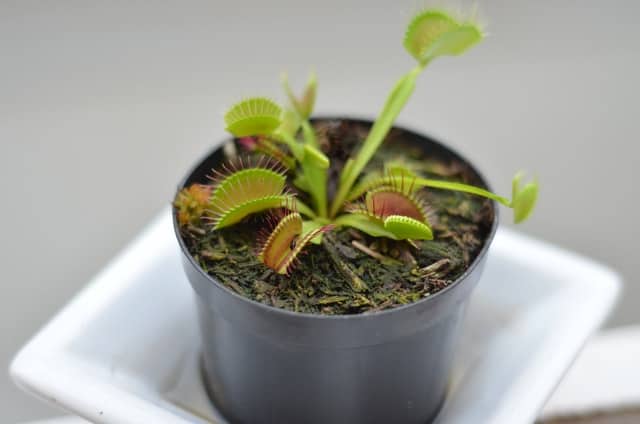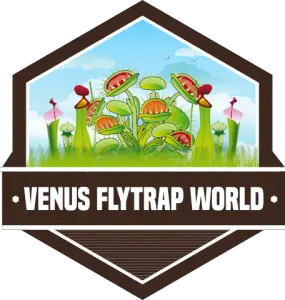Using the wrong water for Venus flytrap can kill them. Employing tap water for Venus flytraps is a practical solution due to its low cost and availability, but it is not always appropriate.
Most tap water is unsuitable for Venus flytraps as it contains more than 50 parts per million (ppm). The minerals and other dissolved solids present in tap water are harmful to Venus flytraps. The compound builds up in the soil, weakening or killing the plant. You can verify the composition of the tap water by employing a TDS meter.
In this article, you will learn to determine if tap water is a suitable option for your plant. Also, I will give you some alternative options besides tap water. Remember, employing the wrong water source can be life-threatening for your plant.
Is Tap Water Suitable for Venus Flytrap?
In their natural habitat, Venus flytraps grow in very poor soil with little to no access to minerals or other elements. As a result, Venus flytraps have developed an intolerance to nutrients and other dissolved solids.
The soil you employ for Venus flytraps must be pure and unenriched, and the water you employ should also be pure. The presence of additional elements can weaken and eventually kill your plant.
Some tap water is considered pure enough to employ for Venus flytraps, but the vast majority of tap water is unsuitable. You can easily check the water quality in your home by employing a TDS. A TDS meter measures the total dissolved solids in a liquid. You can determine if the water is pure enough with the measurement results.
Tap water can be suitable for Venus flytraps as it varies in quality between 30 – 300 ppm. Tap water with less than 50 ppm is appropriate. Water between 50 – 100 ppm is a risk but could work depending on the plant’s variety and age. Finally, any water above 100 ppm will certainly harm Venus flytraps.
I do not recommend employing tap water if you do not have a way to measure the water quality of tap water. The dissolved solids in the water can build up in the soil and harm your plant substantially. Instead, employ pure distilled water, reverse osmosis water, or rainwater. Those three water types are completely safe for Venus flytraps. In a later section of this article, I give more information about these three water types and where to obtain them. Keep on reading for more information.
Employing a TDS meter to measure the tap water quality is very easy. You dip the tool into the water and read the result. If you think employing tap water might be a good option for you, get a TDS meter, and verify the results. You can follow this link to Amazon to see some options. All of them are fairly inexpensive (less than 15 dollars).
to Amazon to see some options. All of them are fairly inexpensive (less than 15 dollars).
Can I Use Boiled Tap Water for Venus Flytraps?
Boiling tap water is a useful method to kill bacteria and make the water suitable for human consumption. But, can you employ boiled water for Venus flytraps?
Employing boiled tap water for Venus flytraps is not recommended. The high number of dissolved solids in tap water are harmful to Venus flytraps. Boiling the water will increase dissolved solids’ concentration as it reduces the liquid and does not eliminate minerals and other elements.
Boiling tap water might seem like an appropriate solution to purify the water for Venus flytraps, but that is not true. Never employ boiled water for Venus flytraps. If you do not have other options, it is best to use tap water rather than boiled water for Venus flytraps.
Can I Use Filtered Tap Water for Venus Flytraps?
In most homes, we employ a water filtration system to keep water suitable for human consumption. The filter helps remove any impurities or bacteria. Employing a water filter might sound like a good idea to purify tap water for Venus flytraps. However, this is not always a good idea.
Filtered tap water is not appropriate for Venus flytraps. Standard water filters such as Brita do not filter minerals and other dissolved solids that are harmful to Venus flytraps. Instead of tap water or filtered tap water, it is safe to employ distilled water, reverse osmosis water, or rainwater.
A water filter can help separate pure water from external elements. However, most water filters won’t get rid of minerals and similar elements at a microscopic scale. Filtering water does not make it worst for Venus flytraps. But, it is just unlikely the filtering process will be enough to make tap water pure.
What Water Can I Use for Venus Fly Traps?
Venus flytraps require pure water sources to be healthy. There are three water types that are safe to employ:
- Distilled water
- Reverse osmosis water
- Rainwater
All three of these water types are pure and completely safe for Venus flytraps. Here are more details about each of them:
- Distilled water: You can buy distilled water at most supermarkets and water stores. Supermarkets sell a gallon of distilled water for less than a dollar, and water stores sell a gallon for less than 50 cents. Distilled water is easy to find in stores and relatively inexpensive. I bought a large 5-gallon jug to buy distilled water in the water and ice store. For 1.25 dollars, I can fill it up. That size of water jug can last you months for a couple of Venus flytraps.
- Reverse osmosis water: Reverse osmosis water is also easy to find but less available than distilled water. Most supermarkets don’t carry it, so water stores are a better bet. Reverse osmosis water costs 50 cents to 1 dollar per gallon.
- Rainwater: This water is the only free option. But it is only a suitable alternative if you have enough access to it—some people setup rain collection systems to water their garden. Rainwater does not need to be clean to water Venus flytraps. It is normal if it has dust and some debris, it is still pure from minerals and other harmful components.
Distilled water, reverse osmosis water, and rainwater are all suitable for Venus flytraps. None is better than others. All of them provide a pure source, harmless for carnivorous plants.
Venus Flytrap Watering Basics
In this short section, you will learn the basics of how to water a Venus flytrap.
Follow these considerations when watering Venus Flytraps:
- Only employ pure water sources for Venus flytraps.
- Keep the soil moist at all times; Venus flytraps thrive in humid environments.
- Water the soil until it is humid all around.
- Do not flood the soil. It should be humid but not damp.
- Water again once the ground is less humid.
- Adjust the watering frequency through the seasons.
- Explore watering from the bottom techniques. The water tray method is a very effective practice to water Venus Flytraps.

Mastering the watering process for Venus flytraps and carnivorous plants, in general, is critical to keep them healthy. The bullet points are only a summary; you can read the complete guide here: Venus Flytrap Watering Guide . With the guide, you can master the watering process in less than five minutes.
. With the guide, you can master the watering process in less than five minutes.
How to Save a Venus Flytrap After Watering With Tap Water
Employing tap water for Venus flytraps can generate many harmful effects. Usually, Venus flytraps start to weaken, and as the minerals build up in the soil, some leaves might exhibit mineral burns (yellow leaves). Employing tap water won’t kill Venus flytraps immediately but will weaken them over time.
It is possible to save Venus flytrap after using tap water. The process depends on the degree of harm the plant exhibits. For example, some plants might not exhibit any changes; others might show a couple of mineral burns, while others can be losing all their leaves.
Some common solutions to save a Venus flytrap watered with tap water are these:
- Water the plant with pure water several times to drain any dissolved soils in the ground
- Repot the Venus flytrap into fresh soil and water with pure water
This article can guide you through the process of saving your Venus flytrap. Follow the instructions to assess the damage and determine the action plan. The sooner you start, the higher chances you have of saving your plant. Good luck!
